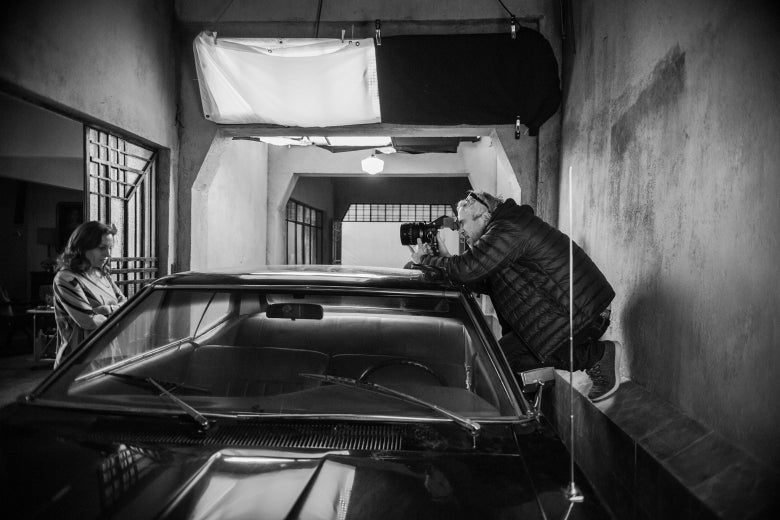 It’s the first film from Alfonso Cuaron, one of the Three Amigos of Mexican directors (along with Innaritu and Del Toro) whose movies always get lots of Oscar attention, since his 2013 astronaut film
It’s the first film from Alfonso Cuaron, one of the Three Amigos of Mexican directors (along with Innaritu and Del Toro) whose movies always get lots of Oscar attention, since his 2013 astronaut film

By Steve Sailer
12/16/2018
Roma is a nice little black & white movie about growing up upper middle class in Mexico City in 1971.
 It’s the first film from Alfonso Cuaron, one of the Three Amigos of Mexican directors (along with Innaritu and Del Toro) whose movies always get lots of Oscar attention, since his 2013 astronaut film
It’s the first film from Alfonso Cuaron, one of the Three Amigos of Mexican directors (along with Innaritu and Del Toro) whose movies always get lots of Oscar attention, since his 2013 astronaut film
Gravity. Unfortunately, it’s suffering from The Artist’s curse in which the Academy and end of year lists overhype an interesting small film that would be more fun to stumble upon without high expectations.
Cuaron, whose father was a rare Mexican nuclear physicist and his mother was a biochemist, grew up in Roma, the fashionable Mexico City neighborhood where his family and their Mixtec-speaking servants lived.
One of their young Indio maids is the main character of what plot there is. Presumably, the title Roma is also a nod to the neorealist style of 1940s Italian movies filmed on low budgets in Rome, such as Rome, Open City and The Bicycle Thief.
For a film shot in a neorealist style with no color and no musical score, just a lot of incidental sound (such as the constantly barking dogs that I too associate with Mexico), Roma cost a substantial $15 million. Cuaron reproduced the townhouse he grew up in meticulously. But maybe he should have been a little more fanciful because Casa Cuaron turns out to have been lacking in Nabokovian splendor.
He also spent expansively on Felliniesque crowd scenes, such as the background in one scene where, while the main character walks down the street oblivious, an outdoor circus performer is shot out of a cannon. I also liked the kung-fu fascists scene in which Cuaron has assembled hundreds of rightwing martial artists under the guidance of the American deep state.
 But the best stuff is various childhood memories filmed from a 3 foot tall boy’s point of view, such as his father nightly parking his huge Ford Galaxy in their driveway, which is only one inch wider than the car. (I think I might have been to this neighborhood, where my friend’s aunt owned a four story townhouse, on a 1979 RV roadtrip. Driving across Mexico City the next morning was a memorable lesson in just how wide a Winnebago is. For 25 miles, we had to delegate passengers to look out the window and pull in the side mirrors whenever another large vehicle approached.)
But the best stuff is various childhood memories filmed from a 3 foot tall boy’s point of view, such as his father nightly parking his huge Ford Galaxy in their driveway, which is only one inch wider than the car. (I think I might have been to this neighborhood, where my friend’s aunt owned a four story townhouse, on a 1979 RV roadtrip. Driving across Mexico City the next morning was a memorable lesson in just how wide a Winnebago is. For 25 miles, we had to delegate passengers to look out the window and pull in the side mirrors whenever another large vehicle approached.)
On the other hand, lots of talented directors have made this kind of boyhood memories film (e.g., Malick’s Tree of Life and Linklater’s Boyhood), and Roma doesn’t stand out from them. Part of the problem is that Cuaron is trying to tell the story of his Mixtec-speaking maid, but nine year old boys, even ones who are future film directors, aren’t that observant about what life looks like to people of other sexes, races, classes, and ages.
So, while Roma is not wholly lacking in incident, it is lacking in dramatic tension, other than the usual fear inherent in Mexican life that at any moment somebody could get maimed in another random accident caused by the ambient carelessness.
Also, the cinematography is uninspired. You expect a black and white art film to look crisp, right? But Cuaron’s usual cameraman, three-time Oscar winner Emmanuel Lubezki, was unavailable, so Cuaron did the camera work himself. Roma came out muddy looking in low-contrast B&W.
Also, Cuaron edited his autobiographical movie himself and was very generous over how long to linger on each shot. Perhaps my chair was uncomfortable, but that was a pretty long 135 minutes.
A final problem is that life in Mexico is just less visually appealing than life in Italy. Thus the most commercially successful movie recently set in Mexico, Pixar’s Coco, totally revamped what Mexico looks like. (Cuaraon, personally, has lived in London since 2000.)
The Three Amigos are big shots because they make cool looking movies, not because they are philosophical geniuses. Many of their films are kind of ridiculous, such as Cuaron’s Children of Men, Innaritu’s Babel and Birdman, and del Toro’s Oscar winner about the lady who has sex with a frog, My Favorite Color Is Red. Roma is neither ridiculous nor cool looking, so it’s a little meh.
Note: every other critic in the world loved loved loved this movie.
Roma is now on Netflix.
This is a content archive of VDARE.com, which Letitia James forced off of the Internet using lawfare.